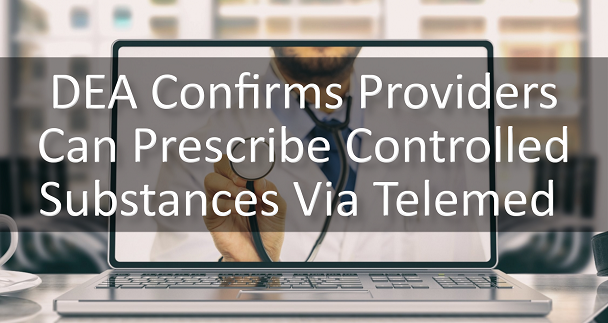
The Department of Health and Human Services (HHS) and the Drug Enforcement Administration (DEA) have released clarification of United States Code contained in the Controlled Substances Act affecting Telehealth visits.
President Trump in a Tuesday briefing said his administration would "encourage everyone to maximize use of telehealth to limit exposure to the virus."
The DEA has clarified that during a Public Health Emergency, which was issued by Secretary Azar of HHS on January 31st, 2020 due to the COVID-19 virus, that controlled substances may be prescribed via telemedicine without first conducting an in-person visit with the patient. The Ryan Haight Act of 2008 established regulations and prohibited heathcare providers from prescribing controlled substances to patients that they haven’t first examined in-person. Section 802(54)(D) of the Controlled Substances Act allows for the Ryan Haight Act to be circumvented during a public health emergency which would allow MDToolbox customers to electronically prescribe controlled substances (EPCS) for patients via telemedicine.
The DEA has stated three conditions for prescribing controlled substances via telemedicine:
- The prescription is issued for a legitimate medical purpose by a practitioner acting in the usual course of his/her professional practice
- The telemedicine communication is conducted using an audio-visual, real-time, two-way interactive communication system.
- The practitioner is acting in accordance with applicable Federal and State law.
Not all States allow for EPCS via telemedicine, prescribers will need to ensure that they are following both their State law as well as the State law where the patient resides prior to prescribing via telemedicine. Some states that allow for EPCS via telemedicine include Indiana, Michigan, Ohio, Florida, Delaware, New Hampshire, West Virginia, and Connecticut. Prescribers should contact their State Medical and Pharmacy Boards as well as the State Boards where their patient resides to ensure their compliance.
HHS has also issued further clarification on the systems that can be used for a telemedicine visit, they have ensured penalties will not be enforced for using apps such as:
- Apple FaceTime
- Facebook Messenger video chat
- Google Hangouts video
- Skype
This is not an inclusive list and are examples of apps that can be used. The app must be a private communication means that support both audio and video. The DEA provided further clarification that public communication apps or streaming services are not to be used such as:
- Facebook Live
- Twitch
- TikTok
The DEA has missed several deadlines to establish rules and a waiver system to allow electronic prescribing of controlled substances via telemedicine during a time in which we are not in a Public Health Emergency. Reducing these road-blocks, as we are seeing with the emergency measures in place due to COVID-19 can help bring healthcare into the 21st century and help reduce stress on our medical system as well as help prevent infections.
We at MDToolbox applaud HHS and the DEA for removing the telemedicine restrictions and our team are watching for more regulation changes on a federal level that would allow electronic prescription of controlled substances via a telehealth practitioner. You will find any policy and regulation updates here in our blog. MDToolbox looks forward to working with telehealth providers and help provide tools and resources in combating healthcare system strain. Contact us for more information or to start your free 30 day free trial.